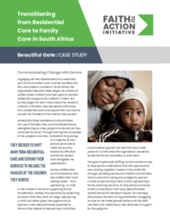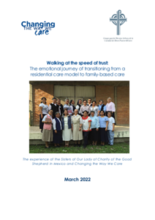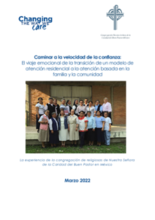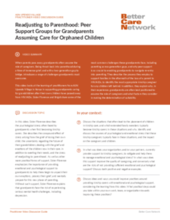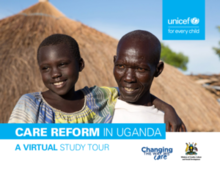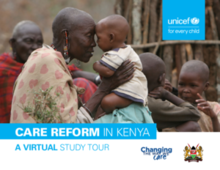Displaying 81 - 90 of 691
Engaging with key stakeholders is an essential part of any transition and must be handled with tact and wisdom. Located in South Africa, the organization Beautiful Gate began its ministry to protect street children and later grew to provide residential programs for children in need. Yet, as they began to learn more about the needs of children in families, they decided to shift away from residential care and expand their services to include the families of the children they served. This case study summary explains how Beautiful Gate communicated these changes with donors.
Typical large-group institutions for abandoned children or orphans are known to be bad for the development of children, but what about small-group care?
This webinar was hosted by the Transitioning Residential Care Working Group of the Transforming Children’s Care Global Collaborative Platform and showcased learning around the transition of residential care services.
This brief documents the first stages of a learning process between Changing the Way We CareSM and the Mexican Province of the Congregation of the Sisters of Our Lady of Charity of the Good Shepherd as the Sisters moved forward in their transition process. It is written for practitioners and organizations, including Catholic actors interested in supporting or engaging in a transition process with women religious and also provides useful information for those engaging in transition with non-faith actors.
Este informe documenta las primeras etapas de un proceso de aprendizaje entre Cambiando la forma en que Cuidamos y la Congregación de las Hermanas de Nuestra Señora de la Caridad del Buen Pastor en México a medida que ellas avanzan en su proceso de transición. Este documento está dirigido a los profesionales, las organizaciones y los actores católicos interesados en apoyar o participar en un proceso de transición con las organizaciones católicas y también proporciona información útil para aquellos que participan en la transición con actores no religiosos. Esto incluye un importante aprendizaje relacionado con la forma de acompañar a las religiosas en el proceso de transición, comprendiendo los matices relacionados con el tiempo, el contenido y el enfoque. Y lo más importante es que explora el componente emocional que conlleva el hecho de que las religiosas, adapten el enfoque de su carisma a medida que se transforman, pasando de proporcionar atención residencial a una atención basada en la familia y la comunidad.
The study was aimed at gaining insights into the operations of privately run, Christian faith-based residential care facilities (RCFs) in Myanmar. The outcomes of this analysis provide important insights to inform ongoing awareness raising, advocacy efforts, approaches to providing technical support and deinstitutionalization, and care reform strategies in Myanmar.
In this video Daisy Muzukutwa, Executive Director of ACE Zambia, addresses the following questions: financial viability of reintegration; future of institutional staff after the transition; and where to begin when considering a transition.
This video summary accompanies the Readjusting to Parenthood: Peer Support Groups for Grandparents Assuming Care for Orphaned Children (Upendo Village, Kenya) practitioner learning video which is part of the Kenya Practitioner Learning Video Series.
This virtual study tour aims to provide you with an overview of care reform in Uganda from the comfort of your own home. Care reform relates to the care of children.
This Changing the Way We Care virtual study tour aims to provide an overview of care reform in Kenya from the comfort of your own home. Care reform relates to the care of children. It refers to efforts to improve the legal and policy frameworks, structures, services, supports and resources that determine and deliver alternative care, prevent family separation and support families to care for children well.

